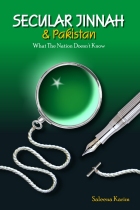|
CONTENTS
Preface
Author's Note
1. Jinnah's nationalism
2. The Munir quote
3. 1949: before the Munir quote
4. 1954: debate to dissolution
5. Munir's legacy: The butterfly effect
6. Iqbal on non-sectarian Islam
7. 1940: deferred secession
8. The Pakistan idea
9. Lahore to Delhi
10. The myths of Jinnah:
1. Jinnah has been transformed into a religious
scholar
2. Jinnah sought a 'modern' democracy
3. Islam was just a propaganda tool
4. Jinnah vetoed proposals for an Islamic state
5. The 11 August 1947 speech was the exposition of a secular state
6. Jinnah never used the words 'ideology of Pakistan'
7. Jinnah's stance against theocracy proves that he was a secularist
8. All religious parties opposed Pakistan as they held it would
be a secular state
9. Jinnah wanted a homeland for Muslims, not an Islamic state
10. Jinnah was a secularist all his life as evidenced in his speeches
11. The Lahore Resolution was a bargaining counter
12. No one in the Muslim League knew what Pakistan meant
11. Cabinet Mission: word games
12. Non-Muslims in an Islamic polity
13. The anecdotal myths
14. The Quran and Jinnah's speeches
Glossary
Appendices:
I. Core principles of the Quran
II. Non-Muslims on Jinnah and Pakistan
III. Constitutional schemes and the Lahore Resolution
IV. The Lahore Resolution (text)
V. The Delhi Resolution (text)
VI. The Objectives Resolution (text)
VII. Bhandara's bill
VIII. The Munir quote in literature - a list
Bibliography
Index
Send this to a friend
|
